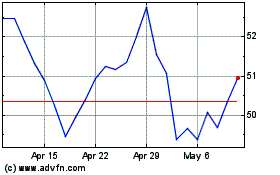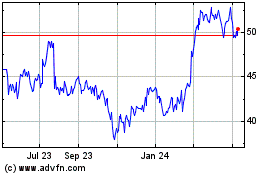CAPE TOWN, South Africa—Africa's biggest company also is one of
its least well-known outside the continent, and it owes its fortune
to one great investment: China.
Naspers Ltd., which has transformed itself from a local
publisher to a media juggernaut valued at $76.5 billion, invested
$34 million in 2001 to take a stake in Tencent Holdings Ltd., now
China's largest and most popular internet-service portal with
nearly a billion instant-messenger active users every month and a
market capitalization of $256.7 billion. Naspers's 34% stake
currently is worth more than Naspers itself.
Now, the media company is pushing into the U.S. and hoping to
topple a household name, Craigslist Inc.
In May, Naspers opened a venture-capital outfit in San Francisco
to be closer to the tech-innovation hub of Silicon Valley and get
early access to technology and internet companies it can help to
scale on a global basis. That followed a $100 million investment
last year in a mobile-classifieds app called Letgo.
The company wants to replicate successes in online classified
platforms in Russia as well as with OLX, the biggest classifieds
site in India and Brazil, by dethroning Craigslist, which remains
the industry's most recognizable brand.
"The U.S. as a market is obviously extremely interesting; it's
also very crowded," Naspers Chief Executive Bob van Dijk said in a
rare interview for the tight-lipped company.
"[Craigslist] is actually executed in quite a suboptimal way,"
said the 43-year-old, who took over as CEO in April 2014 after
working on the group's e-commerce side and previously heading up
eBay Inc.'s German operations. "A mobile-oriented generation
doesn't really want to interact with a clunky '90s website…That
market I think is ripe for disruption." Craigslist didn't respond
to a request for comment.
Analysts say Naspers is undervalued, given that its market
capitalization is less than the value of its Tencent stake, despite
having additional profitable businesses. Naspers—which oversees
more than 40 businesses, including pay television and online
retail, spread across more than 130 countries—also has a 29% stake
in Mail.ru Group, a Russian internet company that runs two of the
country's three-largest social-networking sites.
In December, Naspers raised $2.5 billion to allow flexibility to
invest in attractive growth opportunities during the next few
years, including a controlling stake valued at $1.2 billion in
Avito, an online classifieds platform in Russia. That business has
been booming as Russians hit by an economic downturn buy and sell
secondhand items on the site.
Founded in Stellenbosch, South Africa, in 1915, Naspers was
established as De Nationale Pers Beperkt, or the National Press
Ltd., to produce a Dutch-language newspaper for the country's
Afrikaner population. The company and its publications became
mouthpieces for the National Party, which came into power in 1948
and instituted the system of racial segregation known as
apartheid.
But Naspers has moved far beyond its roots as a publisher in
apartheid-era South Africa. Although the company is still domiciled
here, 77% of its revenue now comes from abroad and its media
segment, which includes the print business, is by far its smallest.
The emerging-markets-focused company also has set its sights on a
lucrative new target: the U.S.
"Even though they were focused on emerging markets, ultimately
they needed to be where the birth of ideas and home of tech really
is," said Philip Short, an analyst at Old Mutual Equities in Cape
Town. "Just because you're in emerging markets doesn't mean you
have to be last to the party."
Naspers's U.S. play is the latest in a series of bold moves for
a company trying to prove that its success goes beyond one landmark
investment. But Naspers's e-commerce division, which includes
classifieds and online retail, operates at a loss despite some
profitable assets, such as Avito.
The video-entertainment business, including sub-Saharan Africa's
biggest pay-TV provider, also has suffered after the global
commodities crash weakened African currencies and consumer
sentiment across the continent.
For the year ended March 31, Naspers said the video business
lost 288,000 customers and took a significant currency hit, because
while it earns revenue in local currencies, it incurs a large
portion of costs, such as sports rights and Hollywood films, in
U.S. dollars.
"That problem is not a fixable problem within a year," Mr. van
Dijk said.
The poor performance in the pay-TV business prompted S&P
Global Ratings to revise its outlook on Naspers's triple-B-minus
rating—one notch above the so-called junk status eschewed by many
investors—to negative.
"In terms of our creditworthiness, I violently disagree," Mr.
van Dijk said. "There is no risk in our bonds. Even if we would be
downgraded…it's neither here nor there."
In June, Naspers said its net profit for the year ended March 31
dropped 21% to $994 million. Still, core headline earnings, which
are adjusted for nonrecurring and nonoperational items and are the
company's preferred measure of performance, were up 17% at $2.98 a
share, driven by growth from the company's internet and classifieds
businesses.
Naspers raised its full-year dividend 11% to 5.20 South African
rand (37 U.S. cents), which executives called a vote of confidence
in the long-term viability of the business.
(END) Dow Jones Newswires
September 18, 2016 21:15 ET (01:15 GMT)
Copyright (c) 2016 Dow Jones & Company, Inc.
eBay (NASDAQ:EBAY)
Historical Stock Chart
From Mar 2024 to Apr 2024

eBay (NASDAQ:EBAY)
Historical Stock Chart
From Apr 2023 to Apr 2024
